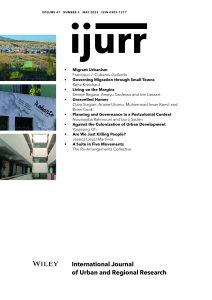This study is concerned with the way colonial land use planning practices have persisted within local institutional structures in the former French colony of Morocco. We use a historical institutionalist approach to reevaluate Morocco’s land use planning history and identify key feedback mechanisms that support the continuity of colonial practices within the Moroccan planning institutional structure. We used institutional mappings to identify key actors involved in planning and examined the formal power relations between them. Interviews were used to discuss the effect of informal interactions on the development of land use plans. We argue that aspects of French colonial planning that persisted within the Moroccan local institutional structure have created constraints for Moroccan land use planning. We focus in particular on how a centralist formalization of planning institutions has hampered the effectiveness of decentralization reforms and explain how institutional patterns deriving from the French paternalist approach to colonial rule have persisted in the form of a duality in modern planning structures. Finally, we argue that this path dependence has been strengthened by the creation of the derogation system as a potential way out for actors who are most capable of inducing change.
Details
Written by:
Noussayba Rahmouni & Izuru Saizen
Digital Object Identifier (DOI)
10.1111/1468-2427.13167
About DOI

